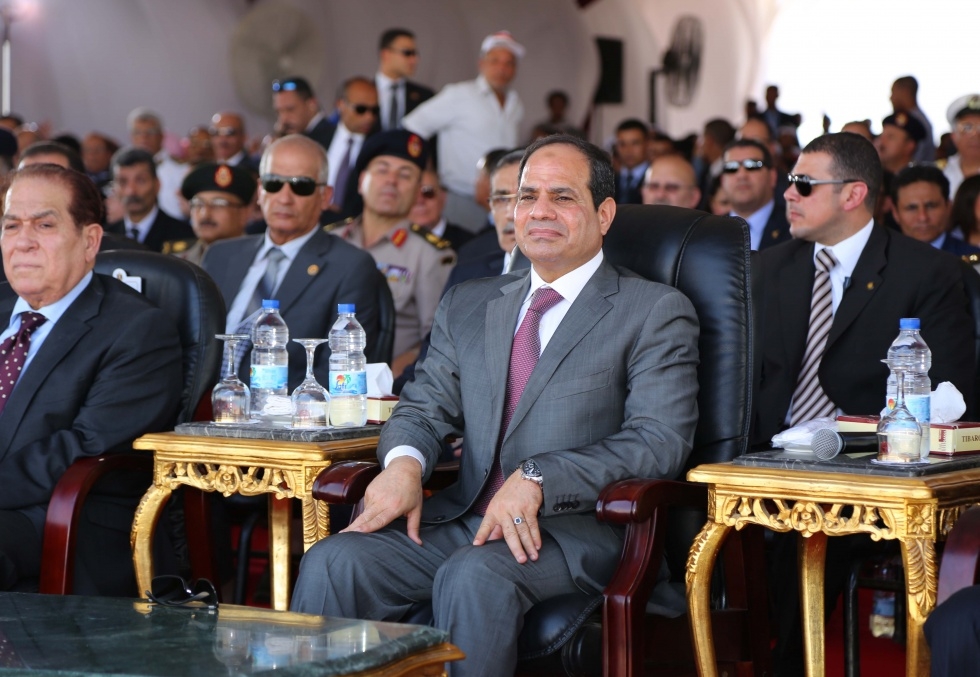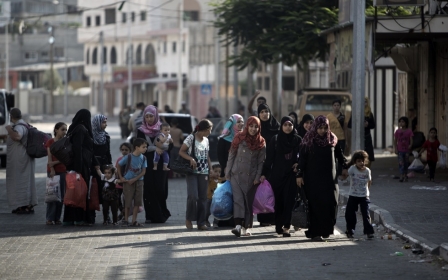The bitter fruits of Egyptian mediation on Gaza

International opinion is changing on the siege of Gaza. More leaders are publicly questioning the wisdom of squeezing Gaza to the point where it explodes. This much can be read into US President Barack Obama’s statement on Thursday that “long-term, there has to be a recognition that Gaza cannot sustain itself permanently closed off from the world". The same is true of the European Union’s position.
It is the central demand of an unusually unified Palestinian delegation in Cairo, that after the blood shed in the first round of hostilities, Gaza cannot return to the status quo. But this is not a view shared by either of Gaza’s neighbours. Indeed it can be usefully asked, who was a greater impediment to negotiations this week - Israel or Egypt? The answer is not obvious.
Palestinian sources at the talks in Cairo said that Egyptian officials categorically rejected the words “lifting the siege” in the proposed truce deal. The same sources said Egypt refused to pass to the Israeli delegation the Palestinian demand for the opening of the port of Gaza.
On Friday morning, the Hamas delegation asked Egyptian officials for an Israeli agreement in principle to end the border closure and allow the rebuilding of Gaza in exchange for extending the truce. Egyptian officials reported that Israel refused. On the other side it was reported that Israel offered to ease the siege, which Hamas rejected.
From the very start, Israel and Egypt tied the ending of the siege to the demilitarisation of Hamas and all the armed factions in Gaza. This was akin to asking fighters who had, in their eyes, successfully resisted an overwhelmingly superior military force for the last month, to hold up their hands, surrender their arms and give up.
The original Egyptian ceasefire initiative was framed for rejection, and not even presented to Hamas before it was released. They have not moved from that since. Abu Ubaydeh, the spokesman for Hamas’ military wing the The Izz al-Din al-Qassam Brigades was even clearer on Thursday evening: "If our demands are not met, including the creation of a seaport, negotiators must withdraw from the negotiations and end this game,"
What is clear just from this readout is that Egyptian and Israeli officials are working hand in glove. That was always the accusation of America’s role in the peace process, but Egypt's tryst with Israel is even clearer and cruder in the talks in Cairo.
From day one, Abdel Fattah al-Sisi surprised Israeli officials with the strength of his anti-Hamas fervour. As the Wall Street Journal usefully reports, when Sisi closed nearly all the tunnels and did nothing to compensate for the passage of supplies above ground, some Israeli officials began to raise the alarm bells about the harshness of Cairo’s actions.
“They were actually suffocating Gaza too much,” the WSJ quoted one Israeli official as saying. If nothing else, Israel has learned in the last eight years how to adjust the noose it had placed around Gaza’s neck, and here was a new convert to the cause tightening it too much and too quickly.
Now think about the man heading Egyptian “negotiators” at the talks. The Palestinian file was always kept in the hands of the General Intelligence Service (GIS). One of the first things that a deputy head of the Muslim Brotherhood, Khairat el-Shater told me when Mohamed Morsi first came to power was that the GIS would remain the central conduit in relations with Israel.
This was one of the reasons why Sisi’s first appointment after the military coup was to clear out the GIS and impose his own man, indeed his mentor, General Mohamed Farid El-Tohamy as its head. Indeed the military coup was preceded by a turf war before military intelligence, which Sisi headed under Morsi, and the general intelligence.
Who met the Palestinian and Israeli delegations? Tohamy. Who is behind what some in Washington regard as conspiracy theories that Hamas is threatening the Egyptian state ? Tohamy. Who encouraged Sisi to step forward and put his name out as a presidential candidate? Tohamy.
This situation is unlike previous rounds of fighting between Israel and Hamas for the very reason that Israel has found a partner so zealous in Egypt, that it can afford to ignore signals from Washington urging restraint. It may have found a partner too zealous and that a wiser course now would be direct Israeli Hamas negotiations.
Israel and Egypt’s strategic interests are different. Israel just wants the rockets to stop and the tunnels to be controlled. Israeli Prime Minister Benjamin Netanyahu knows that the cost of that militarily is unacceptable and said as much to a four-hour cabinet meeting last Saturday. It would involve weeks if not months of urban warfare in the centre of Gaza City, tens of thousands of civilian casualties, and hundreds of Israeli military ones, at the end of which Israel would become responsible again for the welfare of the population of Gaza.
As Shin Bet itself acknowledges, Hamas kept the peace for over a year after the ceasefire deal brokered by Morsi in November 2012. In the first three months, Shin Bet recorded one single attack, two mortar rounds fire from Gaza. And the following year, 2013, was the quietest than any since 2003, when the first primitive rockets were fired.
There is no reason why Gaza cannot return to that quiet, if Israel kept the promise it made at the time to lift the siege. Indeed with a unity government in Gaza and Palestinian Authority police at Gaza’s border crossings, there is every reason to expect that formula is achievable.
The Israeli defence establishment, which remains the most pragmatic source of policy formulation, must see that having rejected the option of ousting Hamas physically from Gaza, the only other choice remains negotiation. However that is sequenced, the price of that is to re-open the borders.
In Egypt, no such pragmatism is evident. Sisi and Tohami have nothing to gain from normalising relations with Hamas and much personally to lose.The only policy of Sisi's presidency is to crush its mortal enemy the Muslim Brotherhood and its armed affiliate Hamas.
For Hamas and the other militant groups in Gaza the situation is crystal clear: they are confident of their ability to continue; they have the support of the people of Gaza, and they see international opinion on the siege changing. They can also see the hesitancy in Israel about unleashing another round of sturm und drang on Gaza.
- David Hearst is editor-in-chief of Middle East Eye. He was chief foreign leader writer of The Guardian, former Associate Foreign Editor, European Editor, Moscow Bureau Chief, European Correspondent, and Ireland Correspondent. He joined The Guardian, from The Scotsman, where he was education correspondent.
The views expressed in this article belong to the author and do not necessarily reflect the editorial policy of Middle East Eye.
Photo Credit: A handout picture released by the Egyptian Presidency on August 5, 2014, shows Egyptian President Abdel Fattah Al-Sisi (C) during the inauguration of a new Suez Canal (AFP)
New MEE newsletter: Jerusalem Dispatch
Sign up to get the latest insights and analysis on Israel-Palestine, alongside Turkey Unpacked and other MEE newsletters
Middle East Eye delivers independent and unrivalled coverage and analysis of the Middle East, North Africa and beyond. To learn more about republishing this content and the associated fees, please fill out this form. More about MEE can be found here.




